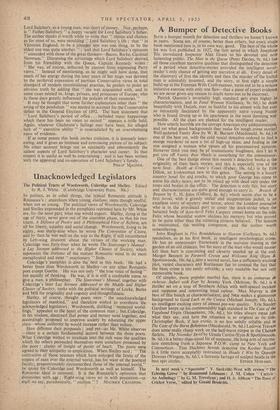Unacknowledged Legislators
IN politics, as in other things, the typical Romantic attitude is Rousseau's : anarchism when young, itatisme, stern though soulful, when not so young. The political views of Wordsworth; Coleridge and Shelley expounded in the pamphlets reprinted here by Mr. White are, for the most part, What one would expect. Shelley, dying at the age of thirty, never grew out of the anarchist phase, so that his two tracts, A Defence of Poetry and A Philosophical View of Reform, are all for liberty, equality and social change. Wordsworth, living to be eighty, was thirty-nine when he wrote The Convention of Cintra, and by then he was well on the way to the Right, if still encumbered by Left-wing illusions about the virtues of the working man. Coleridge was. forty-four when he wrote The Statesman's Manual : a Lay Sermon addressed to the Higher Classes of Society, which represents the eratisnre of the mature Romantic mind in its most metaphysical and most " reactionary " form.
Coleridge's pamphlet is also the best in this book. He had a better brain than Wordsworth or Shelley—or any other Romantic poet except Goethe. His was not only " the true voice of feeling " but equally of thinking. He was, if it is still a creditable name to give a man, a philosopher. The Statesman's Manual, together with Coleridge's later Lay Sermon Addressed to the Middle and Higher Classes of Society, ranks with the political writings of Locke, Burke and Mill for originality and cogency and thoughtfulness.
' Shelley, of course, thought poets were " the unacknowledged legislators of mankind," and therefore wished to overthrow the acknowledged legislators ; Wordsworth, disliking "moneyed world- lings," appealed to the heart, of the common man ; but Coleridge, in his wisdom, discerned that power and money went together, and accordingly proposed to improve society by educating the upper class—whose authority he would increase rather than reduce.
How different their -proposals ; and yet—as Mr. White observes —there is a certain fundamental accord between the three poets. What Coleridge wished, to inculcate into the rich were the qualities which the others persuaded themselves were somehow possessed by the poor: clarity of insight of purity of heart. The poets were agreed in their antipathy to empiricism. When Shelley said : " The cultivation of those sciences which have enlarged the limits of the empire of man over the external world, has for want of the poetical faculty, proportionately circumscribed those 'of the internal world," he spoke for Coleridge and Wordsworth as well as himself. The Romantic ideal is constant. It is the Romantic's optimism that diminishes with. age ; Right-wing views set in with pessimism—or shill! we say, paradoxically, " realism " 7 MAURICE CRANSTON.


































 Previous page
Previous page